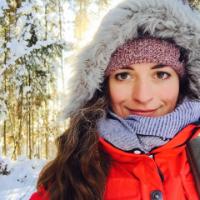Caitlynn Beckett

Office: CS 1017
1 (306) 491-2672
Email: clb268[at]mun[dot]ca
Supervisors
Dr. Arn Keeling
Dr. Brenda Parlee (University of Alberta)
Research Groups
• TERRE-NET
• WaSTE
• Toxic Legacies
• Northern Exposures
• Queer Science Reading Group
Teaching
- Teaching Assistant, Winter 2018, Landscape Geographies (GEOG 3610)
- Teaching Skills Enhancement Program – Mentorship, January-April 2017
- Teaching Skills Enhancement Program, September 2016-December 2016
- Teaching Assistant, Winter 2017, Cultural Geography (GEOG 2001)
- Teaching Assistant, Winter 2016, Urban Geography (GEOG 3701)
- Teaching Assistant, Fall 2015, Geographies of Global Change (GEOG 1050)
Research Assistantships
- Research Assistant, Memorial University, Terre-Net Research Project: Raglan Mine Environmental Forum, Salluit Quebec, January 2017.
- Research Assistant, Memorial University, Northern Exposures Research Project: Mine Remediation Theory Project, September 2016 – December 2016.
Guest Lectures:
- “Ruined Landscapes and Communicating with Future Generations.” Guest lecture for Human Kinetics and Recreation 3555- Outdoor Recreation Management. Memorial University, St. John’s, NL, July 19, 2018.
- Renewable Economics and Environmental Sociology Seminar Series, “Rethinking Remediation: Community Engagement and Mine Closure at the Giant Mine,” February 1, 2018, University of Alberta.
- “Rethinking Remediation,” February 14, 2018, Yukon College, Resource Management Course.
- “Materialities of Waste,” March 29, 2017, Memorial University of Newfoundland, Department of Geography, Geography 2001 (Cultural Geographies).
- Blue Box Seminar Series: “Rethinking Remediation: Mine Closure and Community Engagement at the Giant Mine, Yellowknife, NWT.” March 10, 2017, Memorial University, Department of Geography.
- “Remediation and Restoration Landscapes: Identity, Perspectives and Healing,” February 1, 2017, Memorial University, Department of Geography, Geography 2001 (Cultural Geographies).
- “Multiculturalism and Urban Indigenous Communities: A Case Study of Saskatoon,” March 22, 2016, Memorial University, Department of Geography, Geography 3701 (Urban Geographies)
Awards/distinction:
- Royal Canadian Geographical Society's James Bourque Northern Doctoral Scholarship (2019)
- Association of Canadian Universities in the North (ACUNS), POLAR Knowledge Canada Scholarship (2019)
- SSHRC Doctoral Award (2018-2022)
- TERRE-NET Exchange Award – University of Alberta
- F.A. Aldrich PhD Fellowship
- The Dr. Alan G. Macpherson Graduate Research Award in Historical and Cultural Geography (2017/2018)
- Memorial University’s Recognition of Excellence (2016/2017/2018)
- SSHRC CGS Master's Award (2016/2017)
- The Royal Canadian Geography Society's James Maxwell Human Geography Scholarship (Summer 2016)
- Northern Science Training Program Award (Spring 2016, Spring 2017)
- Women’s Association of Memorial University, Graduate Thesis Scholarship (Fall 2015)
Previous Education
- BA International Studies (major), Biology (minor), University of Saskatchewan (2015)
- MA Geography, Memorial University (2017)
Public Writing
- Beckett, Caitlynn. “Following Pathways of Canada’s Nuclear Legacies.” NiCHE New Scholars, The Otter, http://niche-canada.org/2018/05/21/following-pathways-of-canadas-nuclear-legacies/. May 21, 2018
- Beckett, Caitlynn. “Rethinking Remediation at the Giant Mine, Yellowknife: who decides what is ‘clean enough’?” SEEDs series, The Otter, http://niche-canada.org/2018/02/09/rethinking-remediation-at-the-giant-mine-yellowknife-who-decides-what-is-clean-enough/. February 9, 2018.
Research Project – Rethinking Remediation:
A substantial body of research has analyzed the social, economic and environmental effects of mines in northern Canada during their operational phases. However, after closure these mines do not simply disappear and they can bring about persistent environmental problems and ‘slow violences’ (Nixon, 2011). Mine remediation often entails long-term risks due to the permanent containment of dangerous materials and the mobilization of toxins. To date, research on mine remediation in Canada has focused primarily on its techno-scientific aspects; little is known about remediation as a historical, political and social force in the north. Using the Giant Mine in the Northwest Territories (on the territory of the Yellowknives Dene First Nation), the Faro Mine in Yukon (on the territory of the Ross River and Kaska Dena First Nations) and the Raglan Mine in Quebec (on the territory of the Inuit of Nunavik) as case studies, my research analyzes mine remediation processes in the Canadian sub-Arctic and investigates how local communities shape these processes. Using the concepts of ecological restoration, environmental justice, discard studies, and theories of repair, care and stewardship, this research investigates the gaps in remediation policy and planning. Recognizing that remediation plans tend to focus on the technical challenges of containing pollution, my research asks: How can remediation go beyond a focus on site containment to a broader emphasis on perpetual care, community healing, and an ethics of remediation? I argue that, without a community objectives based approach to remediation, such projects risk continuing colonial systems of degradation and marginalization that allowed for such destruction to happen in the first place. This research contributes to a broader understanding of the socio-political and historic dimensions of mine contamination and remediation, and the development of best practices for mine closure.
Research Interests:
• Resource Management
• Remediation/Reclamation/Restoration
• Environmental Justice
• Environmental Assessment